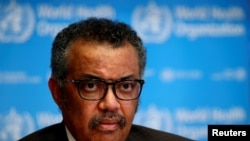The head of the World Health Organization is warning that “no country can just pretend the pandemic is over.”
Speaking to reporters during a virtual briefing from the agency’s headquarters in Geneva Monday, Dr. Tedros Adhanom Ghebreyesus said countries must be serious about “suppressing transmission and saving lives” if they are considering reopening their economies to everyday activities in the face of the COVID-19 pandemic.
“The more control countries have over the virus, the more they can open up,” Dr. Tedros said. “Opening up without having control is a recipe for disaster.”
Dr. Tedros offered “four essential things” for all countries, cities and individuals to observe to bring the virus under control, including preventing large gatherings at stadiums and nightclubs, and implement a rigorous program of testing, contact tracing and isolation. He said countries should take steps to protect vulnerable people, including the elderly, people with underlying conditions and essential workers, which he said will help save lives and alleviate the burden on their health systems.
Dr. Tedros also urged individuals to wear face masks, observe social distancing and frequently wash their hands.
At the same time, the global health agency is also sounding a word of caution over the race to produce a safe and effective vaccine against COVID-19 in response to remarks by Dr. Stephen Hahn, the head of the U.S. Food and Drug Administration, that the agency would consider authorizing an emergency use of a vaccine before its late-stage human trials are complete.
Dr. Soumya Swaminathan, WHO’s chief scientist, said issuing such an authorization “has to be done with a great deal of seriousness and reflection. It’s not something that you do very lightly.”
Dr. Mike Ryan, the agency’s director of the Health Emergencies Program, said any country’s vaccine policy “must be guided by the highest possible ethical standard.”
Coincidentally, a new survey from the World Economic Forum conducted by the firm Ipsos reveals that about 74% of all adults around the world said they would receive a coronavirus vaccine if one became available. Of the 20,000 people across 27 countries surveyed, China was the country most enthusiastic about a vaccine, with 97% in support, while people in Russia were the least enthusiastic, with just 54% expressing a willingness to be vaccinated.
Of respondents in the United States, which leads the world with more than 6 million confirmed COVID-19 cases and 183,585 deaths, about 67% said they would get the vaccine.
Although the rate of new infections in several states has stabilized or even declined on average, several states in the U.S. midwest, including Indiana, Iowa, Kansas, Michigan, Minnesota, Missouri, Nebraska, Ohio and North and South Dakota, have reported an alarming number of new cases in recent days.
As of Tuesday, the total number of novel coronavirus cases around the world stands at over 24.5 million, with nearly 850,000 deaths, according to the Johns Hopkins University coronavirus tracking project.




